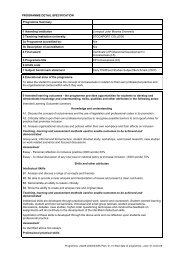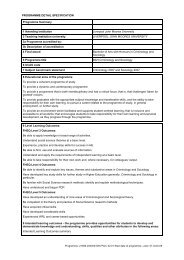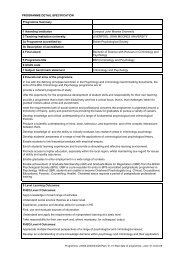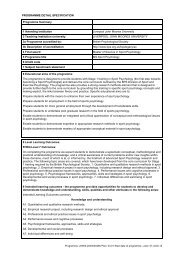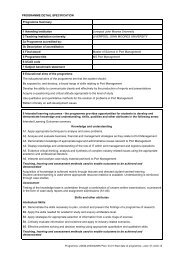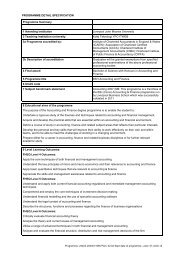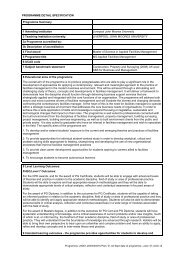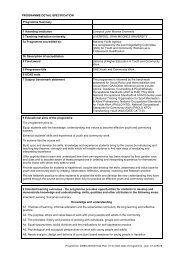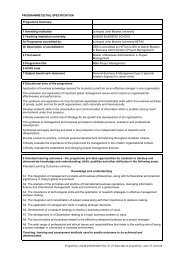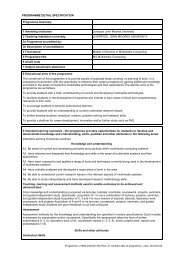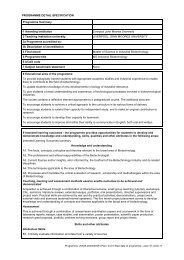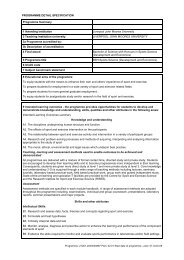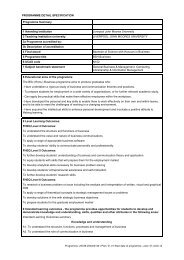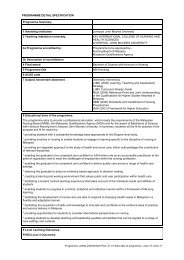Advanced Neonatal Nurse Practitioner (Neonatal Critical Care)
Advanced Neonatal Nurse Practitioner (Neonatal Critical Care)
Advanced Neonatal Nurse Practitioner (Neonatal Critical Care)
Create successful ePaper yourself
Turn your PDF publications into a flip-book with our unique Google optimized e-Paper software.
PROGRAMME DETAIL SPECIFICATIONProgramme Summary1 Awarding institution Liverpool John Moores University2 Teaching institution university LIVERPOOL JOHN MOORES UNIVERSITY3a Programme accredited by:3b Description of accreditationThere is currently no agreed accreditation requirementsfor advanced nursing (or allied health) practice.However, the <strong>Advanced</strong> Paediatric and <strong>Neonatal</strong>Programmes utilise the proposed competencyrequirements drafted by the Nursing and MidwiferyCouncil with regard to advanced nursing practice(currently the only advanced practice competenciesagreed by a regulatory body in the UK).In addition, important policy documents from the RoyalCollege of Paediatrics and Child Health (RCPCH), theDepartment of Health (DH), and the NHS have guidedthe direction of the programmes. In the currentabsence of regulation of the <strong>Advanced</strong> <strong>Nurse</strong><strong>Practitioner</strong> and <strong>Advanced</strong> <strong>Practitioner</strong> roles, guidancefrom these organisations is fundamental to assure bothquality and governance issues are addressed.4 Final award Master of Science in <strong>Advanced</strong> <strong>Neonatal</strong> <strong>Nurse</strong><strong>Practitioner</strong> (<strong>Neonatal</strong> <strong>Critical</strong> <strong>Care</strong>)5 Programme title MS.<strong>Advanced</strong> <strong>Neonatal</strong> <strong>Nurse</strong> <strong>Practitioner</strong> (<strong>Neonatal</strong><strong>Critical</strong> <strong>Care</strong>)6 UCAS code7 Subject benchmark statement The advanced practice role in paediatric and neonatalcare has been informed by a policy guidance from theDepartment of Health (DH), Royal College ofPaediatrics and Child Health (RCPCH), the RoyalCollege of Nursing (RCN), the Nursing and MidwiferyCouncil (NMC), the National Organisation of <strong>Nurse</strong><strong>Practitioner</strong> Faculties (NONPF) and the Association ofFaculties of Pediatric <strong>Nurse</strong> <strong>Practitioner</strong> Programs(AFPNP).8 Educational aims of the programmeThe programme aims of the <strong>Advanced</strong> Paediatric and <strong>Neonatal</strong> Practice Programmes are adapted fromDepartment of Health (2004) and NHS Workforce Development Confederation (Sargent, 2003) definitions ofadvanced practice. More specifically, the <strong>Advanced</strong> Paediatric and <strong>Neonatal</strong> Practice Programmes aim todevelop clinically autonomous practitioners that:1. Have highly specialised and highly developed knowledge and skills (beyond those required for professionalregistration) that encompass the breadth and depth of current and future professional practice.2. Accept the full responsibility for providing those services, hitherto undertaken by others, in definedcircumstances.Department of Health. (2004). Health Professionals Learning Beyond Registration: Developing a SharedFramework. University of Salford, September 2004.Sargent, J. (2003). A Proposal to Develop a National Framework for Assistant and <strong>Advanced</strong> <strong>Practitioner</strong>s.Workforce Development Confederation Standing Conference, August 2003.9 Level Learning Outcomes:FHEQ Level 7 Outcomes:1. Exercise advanced clinical reasoning, critical thinking and creative problem solving (based on advancedtheoretical knowledge) in the assessment and management of neonatal, infant, child and adolescent illness andhealth in a variety of clinical settings.2. Utilise sophisticated scientific knowledge and clinical judgement in the achievement of terminal competenciesfor advanced paediatric and neonatal practice.3. Develop applied research skills which contribute to the enhancement and development of advancedProgramme: 22786-2000002649 Plan: 04.01 Start date of programme - plan: 01-AUG-13
paediatric and neonatal practice and the child health evidence-base in addition to informing those who impactupon the lives of neonates, infants, children and young people.4. Serve as models of collaborative practice with other health care professionals.5. Contribute to the leadership and advancement of contemporary professional health care.6. Improve the health and well being of neonates, infants, children, adolescents and their families throughpartnerships in the health care delivery and wider advocacy and policy-making contexts.7. Recognise and appreciate the cultural context(s) that impact upon the health and well-being of the family unit.9 Intended learning outcomes - the programme provides opportunities for students to develop anddemonstrate knowledge and understanding, skills, qualities and other attributes in the following areas:Intended Learning Outcomes summaryKnowledge and understandingA1. In-depth knowledge and critical understanding of neonatal advanced practice within a variety of critical caresettings.A2. In-depth knowledge of the pathogenesis of paediatric disease processes; (encountered in neonatal criticalcare practice); integration of the clinical manifestations of disease to the relevant pathophysiologicalmechanisms; and the subsequent relationships to assessment, diagnosis and management.A3. <strong>Advanced</strong> clinical reasoning, critical thinking and creative problem solving in the assessment andmanagement of neonatal illness and health.A4. <strong>Critical</strong> examination and analysis of the evidence-base related to neonatal advanced practice and neonatalillness/health in critical care settings.A5. <strong>Critical</strong> examination and analysis of a variety of issues intrinsic to neonatal advanced practice roledevelopment (models of care in advanced practice; public health policy, health care access, planning, andservice delivery; organisational and strategic contexts of new role implementation; clinical supervision andgovernance; evidence-based practice; leadership, negotiation, networking and coalition-building in advancedpractice; the nature and influence of power; accountability, authority and liability; advocacy and the rights of theneonate).A6. Ability to explore, critically review, consolidate, extend and apply a systematic and coherent body ofknowledge relating to neonatal advanced practice and the assessment and management of neonatal health andillness in a variety of critical care settings.Teaching, learning and assessment methods used to enable outcomes to be achieved anddemonstratedInteractive lectures, seminars, tutorials; on-line discussion boards; problem-based learning exercises;evidence-based practice presentations; self-directed and reflective learning; video streaming; reflective practice;clinical supervision and case presentations.AssessmentOral and written presentations, unseen examinations, written assignments, OSCE examination, clinicalevaluation, clinical practice portfolio. Development of a portfolio (in place of a dissertation) which includes anumber of pieces of work (including a systematic review of the evidence-base with regard to a clinical issuewithin paediatric advanced practice), that is designed to demonstrate independent learning, originality ofthought, creativity and innovation with regard to advanced practice. A viva will be used to challenge/exploreissues raised by the portfolio.Intellectual SkillsB1. Concept explorationB2. <strong>Critical</strong> analysisB3. Synthesis of ideasB4. Theory to practice applicationB5. ReflectionB6. Creative use of knowledgeB7. <strong>Advanced</strong> clinical decision-makingB8. Evaluation and critiquingSkills and other attributesB9. Integration of concepts from interdisciplinary and multi-disciplinary perspectivesTeaching, learning and assessment methods used to enable outcomes to be achieved andProgramme: 22786-2000002649 Plan: 04.01 Start date of programme - plan: 01-AUG-13
demonstratedInteractive lectures, seminars, tutorials; on-line discussion boards; problem-based learning exercises;evidence-based practice presentations; self-directed and reflective learning; video streaming; reflective practice;clinical supervision and case presentations.AssessmentOral and written presentations, unseen examinations, written assignments, OSCE examination, clinicalevaluation, clinical practice portfolio. Development of a portfolio (in place of a dissertation) which includes anumber of pieces of work (including a systematic review of the evidence-base with regard to a clinical issuewithin paediatric advanced practice), that is designed to demonstrate independent learning, originality ofthought, creativity and innovation with regard to advanced practice. A viva will be used to challenge/exploreissues raised by the portfolio.Professional practical skillsC1. Communicate ideas, principles and theories effectively by oral and written means.C2. Engage in critical discussion and creative use of key ideas and concepts.C3. Access a range of on-line sources of information.C4. Transfer and apply skills of idea synthesis and creativity in the development of argument and discussion.C5. Formulate and communicate knowledge, understanding and research findings into articulate, coherent andwell-developed arguments, conclusions and recommendations.C6. Engage in the research process including systematic literature review; research appraisal and critique;statistical synthesis; and presentation of findings, conclusions and recommendations.C7. Integrate research findings into clinical practice (i.e. the assessment, diagnosis and management of infants).Teaching, learning and assessment methods used to enable outcomes to be achieved anddemonstratedInteractive lectures, seminars, tutorials; on-line discussion boards; problem-based learning exercises;evidence-based practice presentations; self-directed and reflective learning; video streaming; reflective practice;clinical supervision and case presentations.AssessmentOral and written presentations, unseen examinations, written assignments, OSCE examination, clinicalevaluation, clinical practice portfolio. Development of a portfolio (in place of a dissertation) which includes anumber of pieces of work (including a systematic review of the evidence-base with regard to a clinical issuewithin paediatric advanced practice), that is designed to demonstrate independent learning, originality ofthought, creativity and innovation with regard to advanced practice. A viva will be used to challenge/exploreissues raised by the portfolio.Transferable / key skillsD1. Use of learning resourcesD2. Increasingly independent learningD3. Reflection of own practiceD4. Action planningD5. Research skillsD6. Collaborative inter-professional workingD7. Identifying and pursuing own areas of interestD8. Negotiating learning goals and their achievementD9. Acting as a change agentD10. Development of leadership skillsD11. Development of advanced clinical reasoning, critical thinking and creative problem-solving skillsTeaching, learning and assessment methods used to enable outcomes to be achieved anddemonstratedInteractive lectures, seminars, tutorials; on-line discussion boards; problem-based learning exercises;evidence-based practice presentations; self-directed and reflective learning; video streaming; reflective practice;clinical supervision and case presentations.AssessmentOral and written presentations, unseen examinations, written assignments, OSCE examination, clinicalevaluation, clinical practice portfolio. Development of a portfolio (in place of a dissertation) which includes aProgramme: 22786-2000002649 Plan: 04.01 Start date of programme - plan: 01-AUG-13
number of pieces of work (including a systematic review of the evidence-base with regard to a clinical issuewithin paediatric advanced practice), that is designed to demonstrate independent learning, originality ofthought, creativity and innovation with regard to advanced practice. A viva will be used to challenge/exploreissues raised by the portfolio.10. Route/Pathway/Field requirements, levels, modules, credits and awardsThe MSc programme is offered in full-time or part-time modes with fall back awards of postgraduate certificate ordiploma in <strong>Advanced</strong> <strong>Neonatal</strong> <strong>Critical</strong> <strong>Care</strong>. Due to the regulatory and titling issues in advanced practice (i.e.use of the title '<strong>Advanced</strong> <strong>Nurse</strong> <strong>Practitioner</strong>' or '<strong>Advanced</strong> <strong>Practitioner</strong>' only allowed for MSc level awards) thefall back awards need to be titled: PG Diploma in <strong>Advanced</strong> <strong>Neonatal</strong> <strong>Critical</strong> <strong>Care</strong> or PG Certificate in<strong>Advanced</strong> <strong>Neonatal</strong> <strong>Critical</strong> <strong>Care</strong>.The programme is structured around the Academic Framework. If students have to break off from study, forwork or personal reasons, the credits gained up to that point are retained and may be used to return to study atan appropriate future date. The modular programme allows students to structure their programme of study withincertain prescribed limits as outlined in the Academic Framework and Assessment regulations. There are 3optional modules provided within the programme; additionally, students are able to develop personal interestsand reflect on individual experiences throughout the core module content.In exceptional circumstances, where the candidate requires a named (e.g. route specific) PG Cert., then he/shewill be able to exit with a PG Cert. (fall back award) that is route specific if 60 credits (including 40 that are routespecific) are successfully completed. For example, a GP with a special interest in ambulatory paediatrics couldexit with a PG Cert. in Paediatric Ambulatory <strong>Care</strong> (having successfully completed Paediatric Ambulatory <strong>Care</strong>1, 2, and 3); or a Paediatric Intensive <strong>Care</strong> Registrar could exit with a PG Cert., in Paediatric <strong>Critical</strong> <strong>Care</strong>(having successfully competed Paediatric <strong>Critical</strong> <strong>Care</strong> 1, 2 and <strong>Advanced</strong> Paediatric Ventilation). If a studentachieves 60 credits in modules (not including 2 route specific modules), then they can be awarded a PG Cert. in<strong>Advanced</strong> Paediatric <strong>Care</strong>.MSc <strong>Advanced</strong> <strong>Neonatal</strong> <strong>Nurse</strong> <strong>Practitioner</strong> (<strong>Neonatal</strong> <strong>Critical</strong> <strong>Care</strong>)Core:7005NPAPP <strong>Neonatal</strong> <strong>Critical</strong> <strong>Care</strong> 17006NPAPP <strong>Neonatal</strong> <strong>Critical</strong> <strong>Care</strong> 27007NPAPP <strong>Neonatal</strong> <strong>Critical</strong> <strong>Care</strong> 37012NPAPP <strong>Advanced</strong> Paediatric and <strong>Neonatal</strong> Health Assessment7013NPAPP <strong>Advanced</strong> Paediatric Pathophysiology7017NPAPP <strong>Advanced</strong> Management and Research in PaediatricsOptions:7008NPAPP <strong>Advanced</strong> Paediatric Ventilation7018NPAPP <strong>Advanced</strong> Paediatric Pharmacology and Prescribing7000NPAPP Independent and Supplementary Prescribing ( should be taken as an option if the student does nothave a separate prescribing qualification, but must be taken as a separate CPD)MSc <strong>Advanced</strong> <strong>Practitioner</strong> (<strong>Neonatal</strong> <strong>Critical</strong> <strong>Care</strong>)Core:7005NPAPP <strong>Neonatal</strong> <strong>Critical</strong> <strong>Care</strong> 17006NPAPP <strong>Neonatal</strong> <strong>Critical</strong> <strong>Care</strong> 27007NPAPP <strong>Neonatal</strong> <strong>Critical</strong> <strong>Care</strong> 37012NPAPP <strong>Advanced</strong> Paediatric and <strong>Neonatal</strong> Health Assessment7013NPAPP <strong>Advanced</strong> Paediatric Pathophysiology7017NPAPP <strong>Advanced</strong> Management and Research in PaediatricsOptions:7008NPAPP <strong>Advanced</strong> Paediatric Ventilation7018NPAPP <strong>Advanced</strong> Paediatric Pharmacology and Prescribing7000NPAPP Independent and Supplementary Prescribing ( should be taken as an option if the student does nothave a separate prescribing qualification, but must be taken as a separate CPD)Pg Dip <strong>Advanced</strong> <strong>Neonatal</strong> <strong>Critical</strong> <strong>Care</strong>Core:Programme: 22786-2000002649 Plan: 04.01 Start date of programme - plan: 01-AUG-13
7005NPAPP <strong>Neonatal</strong> <strong>Critical</strong> <strong>Care</strong> 17006NPAPP <strong>Neonatal</strong> <strong>Critical</strong> <strong>Care</strong> 27007NPAPP <strong>Neonatal</strong> <strong>Critical</strong> <strong>Care</strong> 37012NPAPP <strong>Advanced</strong> Paediatric and <strong>Neonatal</strong> Health Assessment7013NPAPP <strong>Advanced</strong> Paediatric PathophysiologyOptions:7008NPAPP <strong>Advanced</strong> Paediatric Ventilation7018NPAPP <strong>Advanced</strong> Paediatric Pharmacology and Prescribing7000NPAPP Independent and Supplementary Prescribing ( should be taken as an option if the student does nothave a separate prescribing qualification, but must be taken as a separate CPD)Award RequirementsMaster of Science in <strong>Advanced</strong> <strong>Neonatal</strong> <strong>Nurse</strong> <strong>Practitioner</strong> (<strong>Neonatal</strong> <strong>Critical</strong> <strong>Care</strong>)For information about awards, see http://www.ljmu.ac.uk/Academic_Enhancement/121984.htmLevel 7 Potential Awards on completion Master of ScienceCore Option Award Requirements7005NPAPP NEONATAL CRITICALCARE 17006NPAPP NEONATAL CRITICALCARE 27007NPAPP NEONATAL CRITICALCARE 37012NPAPP ADVANCEDPAEDIATRIC AND NEONATALHEALTH ASSESSMENT7013NPAPP ADVANCEDPAEDIATRIC PATHOPHYSIOLOGY7017NPAPP ADVANCEDMANAGEMENT AND RESEARCH INPAEDIATRICS7008NPAPP ADVANCEDPAEDIATRIC VENTILATION7018NPAPP ADVANCEDPAEDIATRIC PHARMACOLOGYAND PRESCRIBING160 core credits at level 720 option credits at level 70 elective credits at level 711 Opportunities for work-related learning ( location and nature of activities)A variety of clinical sites around the country will be utilised (as neccessary) for the clinical component of theprogramme. Every attempt will be made to keep students as close to home as possible in order to: (1) decrease(as far as is possible) the distances required to travel; and (2) to facilitate the relationships and partnerships thatclinical placements can build between different organisations. These include: various DGHs, general practices,walk-in centres, Sure Start centres, children's centres, and tertiary care centres across the region and nationally(as required); in addition the Liverpool-based sites include: the Liverpool Women's Hospital, Royal LiverpoolChildren's NHS Trust, Smithdown Children's NHS Walk-in Centre. There are specific numbers of hoursassociated with individual clinical modules.12 Criteria for admissionOtherNote the wider admission criteria (i.e. criteria for both nurse and non-nurse candidates). This is in order toaddress the wider modernisation, workforce and role redesign agendas in advanced practice that are not'nurse-only' initiatives; thus it is imperative that advanced practitioner programmes allow for access opportunitiesfor both nurses and non-nurses.<strong>Neonatal</strong> <strong>Critical</strong> <strong>Care</strong> RouteNURSE CANDIDATES: STANDARD ENTRYChildren's Nursing Qualification plus:1. First or second-class degree in relevant specialty2. Appropriate academic references3. Appropriate post-registration experience (including Level 3 <strong>Neonatal</strong> CPD)4. Support from employer (in an appropriate clinical setting)5. Satisfactory Enhanced CRB checkProgramme: 22786-2000002649 Plan: 04.01 Start date of programme - plan: 01-AUG-13
6. Satisfactory Occupation Health Clearance (from employer)NURSE CANDIDATES: NOT MEETING THE STANDARD ENTRY REQUIREMENTSCandidates that do not hold a first degree may be considered where they are able to (additionally) demonstrate:1. A range of skills including recent evidence of successful completion of a Level 3 academic module and/or anentry examination (seen paper pertaining to relevant clinical scenario)2. Appropriate verbal, written and communication skills3. The ability to seek out and analyse information4. The ability to problem-solve and think critically5. Research knowledge equivalent to an undergraduate research methods or evidence-based practice module(i.e. 15-20 Level 3 CATS points)Candidates that do not hold a Childrens Nursing Qualification may be considered when they are able to(additionally) demonstrate:1. Significant clinical experience working with neonates2. A portfolio of evidence that demonstrates theoretical knowledge with regards to the growth and developmentof infants, children and young peopleOTHER CANDIDATESRegistered health professional in good standing plus:1. First or second-class degree in relevant area2. Significant clinical experience working with neonates in the critical care setting3. A portfolio of evidence that demonstrates foundation theoretical knowledge with regard to the growth anddevelopment of infants, children and young people4. Appropriate academic references5. Appropriate post-registration experience6. Support from employer (in an appropriate clinical setting)7. Satisfactory Enhanced CRB check8. Satisfactory Occupation Health Clearance (from employer)Candidates that do not hold a first degree may be considered where they are able to (additionally) demonstrate:1. A range of skills including recent evidence of successful completion of a Level 3 academic module and/or anentry examination (seen paper pertaining to relevant clinical scenario)2. Appropriate verbal, written and communication skills3. The ability to seek out and analyse information4. The ability to problem-solve and think critically5. Research knowledge equivalent to an undergraduate research methods or evidence-based practice module(i.e. 15-20 Level 3 CATS points)Prospective candidates may be required to attend an interview in order to provide evidence to support theirapplication.13 Information about assessment regulationsAssessment of practice is integrated into many of modules in the programme (see specific module proformas fordetails). Practice competence in the clinical modules will be assessed using the <strong>Advanced</strong> Paediatric and<strong>Neonatal</strong> Competencies and a Clinical Practice Portfolio. In modules where clinical practice competence isassessed, the credit for the module will only be released (and the module passed) when competence has beendemonstrated.All programmes leading to LJMU awards operate within the University's Academic Framework. Full details areavailable from:http://www.ljmu.ac.uk/Academic_Enhancement/121984.htmA programme operating within the Framework may be unable to comply with all the requirements of theFramework. In these circumstances the programme team may apply to the Academic Planning Panel for aprogramme variance which will be considered against agreed criteria that the variance is a nationally publishedcondition of an accrediting / professional body, without which the programme could not be accredited.14 Indicators of quality:Programme: 22786-2000002649 Plan: 04.01 Start date of programme - plan: 01-AUG-13
Institutional audit outcomesThe University is subject to Institutional Review by the Quality Assurance Agency on a 6 year cycle. A publishedreview report is then available on the QAA web site: www.qaa.ac.uk15 Support for students and their learningStudents will be encouraged to access University-wide support services including the Academic DevelopmentUnit, Learning Resources, <strong>Care</strong>ers and Welfare services. In addition, the following are available to students andwill be discussed during induction:Induction ProgrammeStudent HandbookModule HandbooksLibrary and Study Skills Packages (e.g. 'Stepping Stones')Learning Resource CentresPersonal Tutor (access by e-mail, appointment or drop-in)Learner Support ServicesStudent Welfare<strong>Care</strong>ers Service16 Methods for evaluating and improving the quality and standards of teaching and learningThe Role of the External ExaminerExternal examiners approved by the University are appointed to cover whole programmes or clusters of moduleswithin programmes. The role of the external examiner is to provide informative comment and recommendationsupon whether or not:- the University is maintaining the threshold academic standards set for awards in accordance with theframeworks for higher education qualifications and applicable subject benchmark statements- the assessment process measures student achievement rigorously and fairly against the intended outcomes ofthe programme(s) and is conducted in line with the University policies and regulations- the academic standards are comparable with those in other UK higher education institutions of which externalexaminers have experience- the achievement of students are comparable with those in other UK higher education institutions of which theexternal examiners have experienceand to provide informative comment and recommendations on:- good practice and innovation relating to learning, teaching and assessment observed by external examiners- opportunities to enhance the quality of the learning opportunities provided to students.Subject standards for all taught programmes of study are specified using an outcome based learning model.Attainment is measured against the standard and individual student performance is moderated at assessmentboards. This involves both internal moderation (by LJMU staff and/or partner institution staff) and externalmoderation (by External Examiners). Internal annual programme self-assessment is informed by broad rangingstudent feedback, external examiners and academic staff who conduct module review. External qualityassessment by Professional Statutory Regulatory Bodies and the Quality Assurance Agency for HigherEducation confirms that standards are set at the appropriate level and that quality of learning opportunities aresubject to continuing improvement. The quality of teaching is assured through staff review and staff developmentin learning, teaching and assessment. Designated committees have responsibility for the oversight of processeswherein quality and standards are evaluated and improved.Please note: This specification provides a concise summary of the main features of the programme and thelearning outcomes that a typical student might reasonably be expected to achieve and demonstrate if he/shetakes full advantage of the learning opportunities that are provided. More detailed information on the learningoutcomes, content, teaching, learning and assessment methods of each module can be found in the studentmodule guide and course handbook. The accuracy of the information contained in this document is reviewed bythe University and may be checked by the Quality Assurance Agency for Higher Education.17 Key sources of information about the course can be found in:Further details may be obtained from a series of handbooks for students that together provide comprehensiveinformation. Detailed programme information is contained in definitive documentation for the programme. TheVirtual Learning Environment (VLE) is increasingly used to provide module specific information.Programme: 22786-2000002649 Plan: 04.01 Start date of programme - plan: 01-AUG-13
18 Progress FilesIncreasingly, academic guidance is provided within a framework of personal development planning linked toprogress review.Students will maintain a Clinical Practice Portfolio (associated with their clinical modules) and a portfolio ofcoursework will be developed throughout 7017NPAPP (<strong>Advanced</strong> Management and Research in Paediatrics).Semesterly review of these portfolios will allow for personal development planning to be linked (specifically) toprogramme outcomes and review.Programme: 22786-2000002649 Plan: 04.01 Start date of programme - plan: 01-AUG-13



